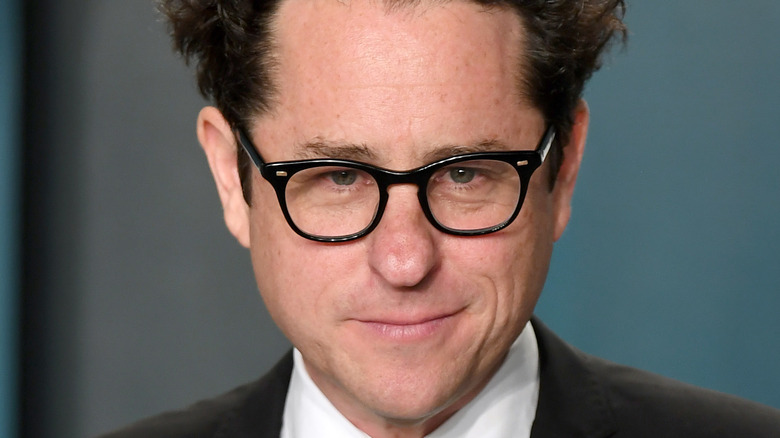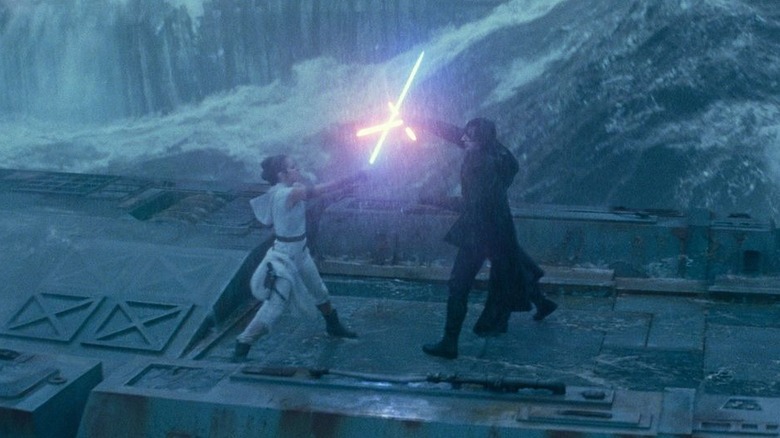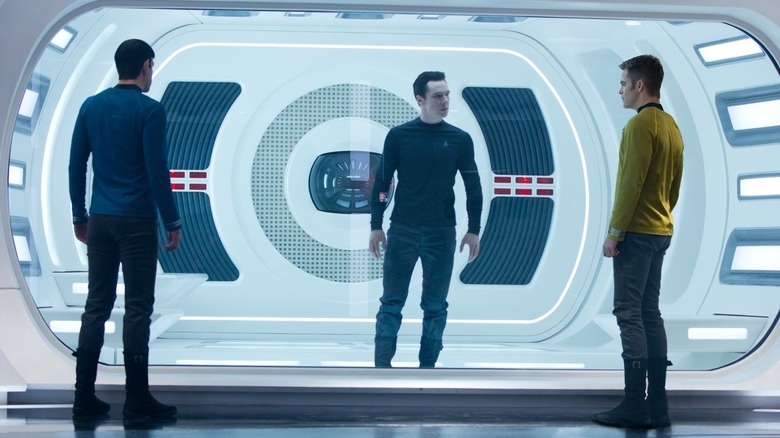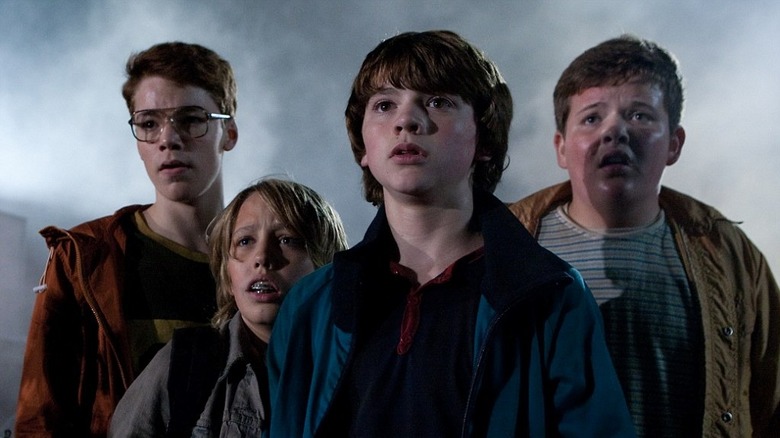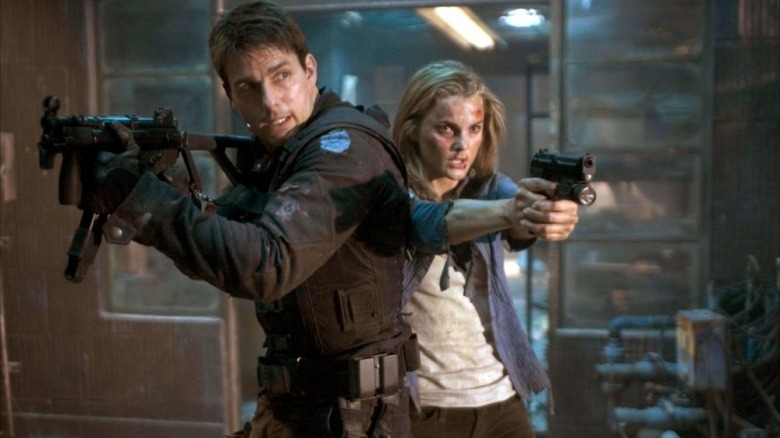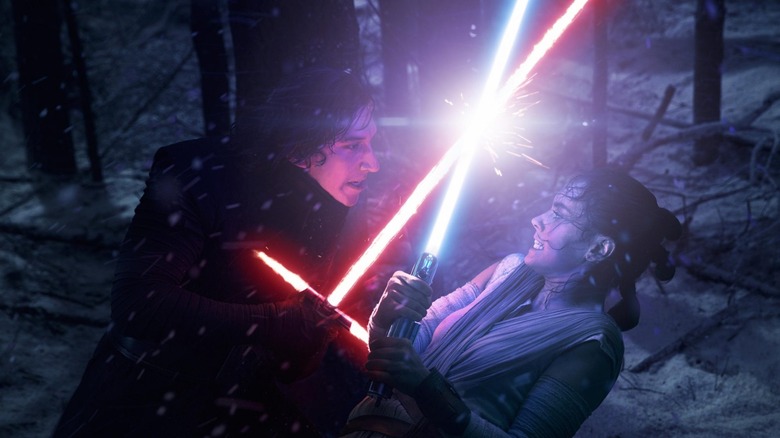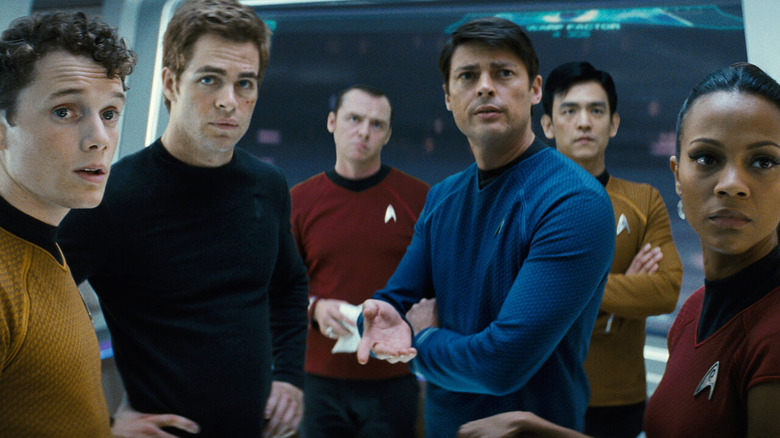Every J.J. Abrams Film Ranked From Worst To Best
J.J. Abrams has been an influential figure in the entertainment industry since his youth. Inspired by his prominent television producer father, Gerald W. Abrams, the young film buff was mentored by Steven Spielberg, and flexed his creative instincts as screenwriter of '90s hits like "Forever Young," "Regarding Henry," and "Armageddon."
In the late '90s and early '00s, Abrams dominated television by creating the highly popular shows "Felicity," "Alias," and "Lost." Combining complex storylines and narrative twists with large ensembles made up of memorable characters, Abrams likes to keep audiences on their toes. Through TV, he also tried his hand at directing for the first time, winning an Emmy for his work on the "Lost" pilot. As such, It was only a matter of time before Hollywood called on Abrams to handle their blockbuster properties. Although he's only directed six feature films, each one of Abrams' movies was highly anticipated and performed well financially. A master of marketing, Abrams generates hype with his "mystery box" approach to storytelling, and his films routinely spark intense online discourse.
Abrams is one of Hollywood's most powerful producers, as his production company Bad Robot handles franchises such as "Cloverfield," "Westworld," "Mission: Impossible," and "Star Trek," as well as several upcoming DC properties for HBO Max. However, Abrams is an accomplished director as well, particularly when it comes to crafting dynamic action sequences. Abrams' directorial career has been divisive, and fans of the "Star Wars" and "Star Trek" franchises are split on his interpretations. Here are all six J.J. Abrams films, ranked from worst to best.
6. Star Wars: Episode IX — The Rise of Skywalker
Abrams is very good at hooking audiences with engaging beginnings, as evidenced by his work creating television pilots and rebooting franchises. Ending a story, however, is something that Abrams has trouble with. While Rian Johnson took the series in a creative new direction by not adhering to the typical Star Wars formula, Abrams opted for a safer route for "Star Wars: Episode IX — The Rise of Skywalker," retconning "The Last Jedi" and making Rey the descendant of Emperor Palpatine. The reveal itself is undramatic, as Palpatine's return wasn't foreshadowed at all, and dampens Darth Vader's sacrifice in "Return of the Jedi."
Many storylines remain unresolved. While the tragic passing of Carrie Fisher forced Abrams to reduce Leia's role, Kylo Ren's still redemption feels inauthentic. Although it's suggested that Finn is Force-sensitive, he never gets to use his abilities. New narratives, such as Jannah's band of former stormtroopers and General Hux's defection, are given so little screen time that they feel like distractions.
The path each character takes to get to Exogul is very confusing. Abrams may have thought he was pleasing fans by adding in familiar characters, but they just wanted a good story. It's hard to tell how much of this is Abrams' fault – he was a last-minute addition to the project, replacing "Jurassic World" director Colin Trevorrow well after Disney set a release date for the final chapter of the Skywalker Saga — but either way, he failed to deliver.
5. Star Trek Into Darkness
Although it's derided by vocal "Star Trek" fans as one of the worst entries in the series, "Star Trek Into Darkness" has merits. Its controversy rests on the decision to make Khan's return to the series a twist and to deny it throughout the film's press tour. Even Abrams admits that the choice was a mistake, but the film deserves to be judged on its own.
The weakest parts of "Into Darkness" are the scenes that directly replicate moments in "Star Trek II: The Wrath of Khan." The two stories are unique, and the repetition feels like a cheap bid at fan service. Spock's hateful cry of "Khan!" after Kirk's presumed death in particular feels like a rip-off of a classic William Shatner moment. In "Star Trek II," Shatner is being purposefully over-the-top to deceive his enemy. Quinto is taking the moment seriously.
However, "Into Darkness" poses interesting questions about the Enterprise crew's responsibility to question their orders. Although originally explorers, "Into Darkness" forces the characters to embark on a military assignment, unaware that they are pawns in a scheme to start a war with the Klingon Empire. It's a compelling parallel to American expansionism that stays true to Star Trek's history of commenting on current political events. In addition, while elements of their relationship are derivative of their first adventure, Chris Pine and Zachary Quinto have great chemistry. In "Into Darkness," Kirk and Spock learn to empathize with each other; the film also benefits from more prominent roles for the rest of the crew.
4. Super 8
"Super 8" is the only film that Abrams has directed that isn't based on an existing property, but it's hardly an original story. The film homages '80s science fiction and adventure films like "The Goonies," "E.T. the Extra Terrestrial," and "Stand By Me." What he lacks in narrative boldness, Abrams makes up for with heart. "Super 8" isn't just a touching story about childhood friends who become heroes in their small town, but a love letter to filmmaking itself.
The only movie on which Abrams is the only credited writer, "Super 8" feels like the director is drawing from his own childhood love of using scrappy filmmaking techniques to emulate his favorite films. There's an appropriate use of nostalgia as the central characters utilize the technology of the late '70s. The scenes in which the crew meticulously tries to find a perfect shot are just as exciting as any of the big action set pieces.
Abrams is not given enough credit for his depiction of male sensitivity, and the strained father-son relationship in "Super 8" is very effective emotionally. The rare Abrams project that doesn't start with frantic action, "Super 8" opens with young Joe (Joel Courtney) and his police sheriff father Jack (Kyle Chandler) reflecting on the loss of Joe's mother. The characters' inability to process their grief is woven throughout the story and ties together beautifully at the end, as the two learn to trust each other and openly express their affection for one another.
3. Mission: Impossible III
While "Mission: Impossible II" was a financial hit, it received negative reviews, and it wasn't clear where the franchise's future lay. In his feature film directorial debut, Abrams paved the way for the saga's growth by establishing a fast-paced, yet intelligent story that developed Ethan Hunt as a character. Hunt's desire to balance his responsibilities to MI6 and his impending marriage to his fiancé Julia (Michelle Monaghan) feels much more personal than the previous films, in which he was basically a superhero.
While the later "Mission: Impossible" films are great, they lack engaging antagonists. Abrams introduced the best villain in the series with Philip Seymour Hoffman as the sadistic arms dealer Owen Davian. Hoffman chews the scenery when he holds Ethan captive, a scene that Abrams uses to open the film. It's hard for any actor to match Tom Cruise's star power, but Hoffman's intensity makes the charismatic actor seem vulnerable — and that makes "Mission: Impossible III" much more exciting.
In addition, Ving Rhames makes a welcome return as Luther Stickell, and Abrams also introduces fun new characters like Zhen Lei (Maggie Q) and Declan Gormley (Jonathan Rhys Meyers) to complete Ethan's team. Abrams also made a great decision to include a cameo by Simon Pegg as the MI6 desk worker Benji Dunn, a fan-favorite who plays a much larger role in later films.
2. Star Wars: Episode VII — The Force Awakens
"The Force Awakens" was the perfect way to kick off a new era of Star Wars storytelling. Intentionally utilizing a narrative similar to "A New Hope" gave Abrams the freedom to introduce fresh new voices to the story while still maintaining the tropes that Star Wars fans have come to know and love.
Rey is a compelling hero who is confused by her newfound abilities. She has developed talents as a mechanic and pilot, but her Force-sensitivity confuses her as she seeks to understand her place in the galaxy. Finn gets a terrific introduction as he defects from the Imperial ranks and embarks on a hero's path. Rey's naivete and Finn's growing confidence lead to some fun comedic banter, and Daisy Ridley and John Boyega both dominate the screen with their unmistakable charisma.
Kylo Ren is among the best-developed villains in the entire Star Wars franchise. A fervent follower of Darth Vader, Kylo strives to live up to the legacy of his idol, and Adam Driver's performance makes Ben Solo both empathetic and terrifying. The abandoned child's embarrassment is relatable, and his untapped rage only fuels his hatred. Driver plays the angry fits for laughs, but ramps up the intensity once Ren kills his father.
In addition, Abrams created one of the best lightsaber duels in the series. Rey and Ren are in a fragile emotional state and lack proper training, so their fight is less choreographed and more brutal. Also? Kylo Ren's cross-blade is a great addition to the mythos. It just looks cool.
1. Star Trek
With "Star Trek," Abrams revitalized a franchise that was essentially dead after the financial disaster that was "Star Trek: Nemesis." Through a prequel that showed the formation of the Enterprise crew, Abrams introduced a new audience to the Trek franchise with a relatable story about a naïve team that bands together to complete its challenging first mission. To that end, Abrams gathered a terrific ensemble cast that brought younger versions of the classic characters to life while respecting their long and storied legacy.
Kirk is not yet the slick operator that William Shatner played. Chris Pine depicts the future captain as an overconfident goofball who needed to learn to take himself seriously. Kirk's ability to get himself in over his head adds a lot of laughs, but Pine shows that Kirk's heart is always in the right place. The film leans into Spock's dual identity as a human and Vulcan, too. Spock faces discrimination from Vulcans despite his high intelligence, and his cerebral attitude annoys his human crewmates. Zachary Quinto captures these idiosyncrasies perfectly, and the transition of Kirk and Spock from bitter rivals to trusted friends gives Abrams' film a strong emotional core.
Where many prequels are limited by having to line up with future events, using an alternate timeline — and making it part of the plot — allows Abrams to create legitimate stakes. It also opens the door for the return of Leonard Nimoy as Spock Prime; it's fun to see the beloved actor return in a mentor role. Equal parts action, humor, and emotion, "Star Trek" epitomizes all of Abrams' strengths.
